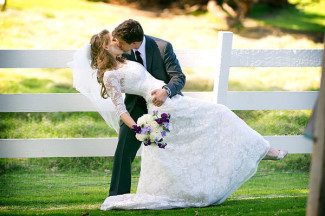 I recently celebrated my first wedding anniversary. Having dated my husband for four years before marriage, we knew each other well. One thing was certain: my dad’s extremely “thrifty” spending habits stuck with me. My husband is more of a spender, but thankfully he keeps us on track by managing our accounts.
I recently celebrated my first wedding anniversary. Having dated my husband for four years before marriage, we knew each other well. One thing was certain: my dad’s extremely “thrifty” spending habits stuck with me. My husband is more of a spender, but thankfully he keeps us on track by managing our accounts.
Honestly, this difference in how each of us will spend money has been one of the more stressful parts of our first year of marriage. I can see how we clash in our spending styles.
My first introduction to extreme poverty came through my parents’ sponsorship of two Compassion children when I was 5 years old. I remember sending and receiving letters and special gifts across cultures. But when I was 12, our “brother” died of malaria. Since then, I’ve felt a call to do something about these preventable deaths.
When I started thinking more about the dire lifestyles of people living in extreme poverty, my cheapskate habits compounded with misappropriated guilt. How could I spend even $60 on a new outfit? Isn’t there always a cheaper option? Couldn’t we always do without this or that? Shouldn’t I be giving it all away? Reading Isaiah 58 made me feel even more guilty, realizing I could use my money to stop oppression rather than spend it selfishly.
But I wasn’t sure how to reconcile saving and spending money, when to spend it on myself and when to spend it on others.

This guilt sometimes carries over to my marriage. When I express these things to my husband, he points out that all these things are relative. We need to give generously and spend wisely, but we also need to have a good theology of wealth and appreciating God’s material blessings.
I don’t want to fake a material martyrdom. That’s selfish in a whole new way.
In the past few months, I’ve learned about a few ways to integrate increasingly simple, conscious and service-oriented actions into our normal lifestyle.
One way I found we can make an impact is through the way my husband and I celebrate special occasions. I learned how we can use events and holidays already on our calendar to help solve issues of poverty. When we throw a block party, we have the opportunity to not only spend time and effort on hospitality but also turn the event into a globally conscious evening. We can be like the Drake family and host a “Global Impact Dinner.”
Another idea I had, included in the ebook Pencil-In Poverty (Download The Free E-Book Here) is to use some of our vacation time to volunteer with a favorite, respected humanitarian organization (local or overseas). We would use our travel budget and vacation time while doing something purposeful. It would also allow us to experience a new culture and certainly bring a welcome break from the office! When we have kids, this will be a natural way to help them learn to be generous with their time, talent and treasure. My husband and I both love these trips because we get to be purposeful with our vacation and our dollars.
When we started integrating some of these ideas into our spending habits, I began to notice an excellent melding of our lifestyles. I became less burdened by spending money, knowing that we are living generously, appreciating God’s gifts and always looking for more unity and growth. Our love for each other grew when we came together to spend and give in unity.
